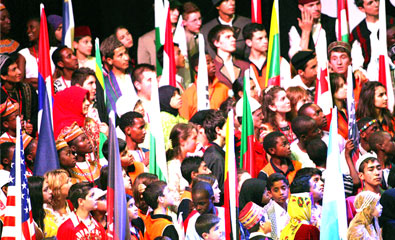Our Human Identity Comes Before Our Muslim Identity
 The 7th Turkish Language Olympiads is a project that belongs to our land. It is the presentation of our values to the whole family of mankind using our language, but more importantly, using a language whose words represent our people's actions and intentions.
The 7th Turkish Language Olympiads is a project that belongs to our land. It is the presentation of our values to the whole family of mankind using our language, but more importantly, using a language whose words represent our people's actions and intentions.
There are 184 countries around the world. In 115 of them, we have our colors, our sounds and our heroes of love. People may quite justifiably ask: "We understand why this project should show interest in the Turkish world and the Muslim world, but what is the reason for opening schools in the Americas, Australia, Vietnam, Papua New Guinea, i.e., the places where neither a sizeable community of Muslims nor Turks exist?"
This project belongs to this land, but it is also a project that concerns all of humanity. Our nation has found it reasonable. Our ability to have a far-reaching impact, which we acquired during our experience with one of the world's most influential empires, of course, has played a great role in this. The distinguished Fethullah Gülen has encouraged us to implement this project, and in order to motivate us, he said, in the beginning: "A Turkey which is not everywhere around the world cannot secure the place it deserves." Now, we see that a new generation of people is growing for the sake of global peace. What we see is a picture that has already gone beyond the horizons of Turkey.
The spirit of this project for humanity is well expressed in the phrase in the headline, which comes directly from the words of Mr. Gülen. Here is an excerpt from the notes I took during my visit last year: "Our human identity comes before our Muslim identity. This is exactly the case. Man is not considered responsible for religious duties until the age of 13. God takes oaths from man."
One of the finest phrases frequently used by the Volunteers Movement, which is associated with Mr. Gülen, is to pay "respect to everyone for their position." This phrase does not allow a justification of "we have no other choice" nor does it imply any forced acceptance. It is an expression of pure sincerity. Yes, anyone expecting respect for his/her position should pay the same respect to the positions of other people. This respect for everyone's position, inspired by Mr. Gülen, is actually an expression of respect for human beings. The following is what Mr. Gülen said in connection with this several weeks ago:
Man is potentially a human being. Whichever religion s/he practices or denies, every individual is a human being. Remember that our Prophet, peace and blessings be upon him, stood up while the body of a Jew was being carried to a cemetery. When his companions were surprised by his move and reminded him that the man was a Jew, the Prophet replied, "Still, he is a human being." God's order that the angels prostrate before Prophet Adam can be regarded as having implications for the qibla and as an expression of the supremacy of his creation and as an emphasis on abiding by the Lord's injunctions, but it can also be interpreted as symbolic assertion of the supremacy of mankind. In other words, it is respect for human nature. Respect for man implies respect for God.
Then, while building bridges or developing our discourse for the sake of dialogue, we must always keep in mind the fundamental truth that our addressees are human beings. Sometimes, we may find ourselves being guided by self-conceit, wrongfully trying to protect our religion with the misguided assumption of being supreme over other religions. The Prophet reports that God says, "If a man comes toward me walking, I'll go to him running." We must equip ourselves with divine ethics.
We are not running after personal achievements. Our primary goal is to tell everyone about God. Whoever we may address, we must never forget the fact that they are human beings, and we must respect man.
Moreover, today can be considered as a sort of unproductive era. Muslims have failed to correctly voice or represent Islam. Muslim have also performed poorly with respect to persuasiveness. In such a time, it would be unfair to categorize people into different groups. We must assume that they potentially have human values. We must blame ourselves for errors. We must acknowledge that we have failed to raise people who can proficiently answer their questions. Also, our representative power must confirm our words.
We are working in the name of humanity, and we deem this as ordered by our religion.
This is a trade. We exchange the beneficial values of other people, cultures or civilizations with our good values.
- Created on .